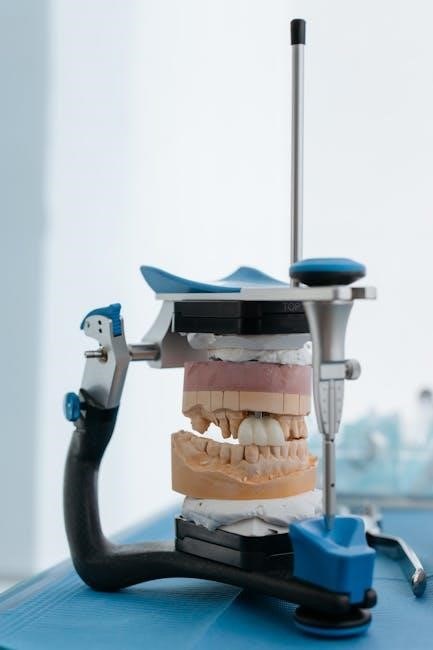Overview of Immediate Denture Post-Op Instructions
Immediate denture post-op instructions guide patients through the healing process after receiving their dentures. Proper care ensures comfort, reduces swelling, and promotes a smooth recovery. Adherence is crucial for optimal results and to prevent complications.
1.1 Importance of Following Instructions
Following post-op instructions for immediate dentures is vital to ensure proper healing and minimize complications. Keeping the denture in place for the first 24-48 hours helps control swelling and promotes a better fit. Removing it too early can lead to swelling, which may affect the denture’s alignment. Adhering to these guidelines ensures the denture functions as intended, supports healing, and prevents issues like sore spots or improper fit. Proper care is essential for long-term comfort and success of the denture.
1.2 Expected Outcomes and Goals
The primary goal of immediate denture post-op instructions is to ensure proper healing, minimize discomfort, and achieve a well-fitting denture. By following the guidelines, patients can expect reduced swelling, controlled bleeding, and a faster adaptation to the denture. The denture helps protect the healing tissues and promotes a natural appearance during recovery. Proper care aims to prevent complications and ensure the denture functions optimally for eating, speaking, and overall comfort. These outcomes are crucial for a successful transition to permanent denture use.

Immediate Post-Op Care (First 24-48 Hours)
Immediate post-op care focuses on the first 24-48 hours, emphasizing healing, controlling swelling, and managing bleeding while keeping the denture securely in place.
2.1 Keeping the Denture in Place
It is crucial to keep the denture in place for the first 24 hours after surgery to minimize swelling and bleeding. Do not remove the denture during this period, even while sleeping, unless instructed by your dentist. This helps the denture act as a protective barrier, promoting healing and preventing complications. Removing it too soon can lead to swelling, making it difficult to reseat the denture properly. Adhering to this guideline ensures a smoother recovery and better adaptation to your new denture.
2.2 Managing Swelling and Bleeding
Swelling and bleeding are common after immediate denture placement. To manage swelling, apply an ice pack to the affected area for 15-20 minutes, repeating as needed. Light bleeding is normal and can be controlled with gauze. Avoid strenuous activities to minimize bleeding. If bleeding increases or persists, contact your dentist. Keeping the denture in place helps reduce swelling and promotes healing. Follow your dentist’s advice to ensure proper recovery and comfort during the initial healing phase.
2.3 Wearing the Denture Overnight
Wearing the denture overnight is crucial for the first few nights to aid healing and reduce swelling. This helps the denture stay in place and promotes proper adaptation to your mouth. After the initial 2-3 nights, it is recommended to remove the denture nightly and soak it in water to maintain its shape and hygiene. Always follow your dentist’s specific instructions regarding overnight wear to ensure optimal comfort and recovery during the healing process.

Pain and Discomfort Management
Pain and discomfort are manageable with prescribed or over-the-counter medications. Monitor for severe pain or unusual symptoms, as these may indicate complications requiring immediate dental attention;
3.1 Recommended Pain Relief Medications
Over-the-counter pain relievers like ibuprofen or acetaminophen are recommended to manage discomfort. Always follow the prescribed dosage and consult your dentist if pain persists or worsens unexpectedly.
3.2 Signs of Excessive Pain or Complications
Excessive pain, severe swelling, or uncontrolled bleeding may indicate complications. If pain persists despite medication or worsens, contact your dentist immediately. Avoid removing the denture yourself, as this could disrupt the healing process or cause further issues. Seek professional guidance to address any concerns promptly and ensure proper recovery.
Oral Hygiene and Denture Care
Proper oral hygiene and denture care are essential for healing and comfort. Gently clean the denture and mouth to prevent infection and maintain hygiene.
4.1 Cleaning the Denture and Mouth
After the initial healing period, gently clean the denture and mouth with a soft brush and mild soap. Avoid harsh products or abrasive materials. Rinse the mouth with warm saltwater to reduce swelling and promote healing. For the denture, soak it in a cleaning solution or water overnight. Always handle the denture carefully to avoid damage. Do not remove the denture immediately after surgery unless instructed by your dentist. If pain occurs, contact your dentist for guidance.
4.2 Rinsing and Soaking the Denture
Rinsing and soaking the denture is essential for maintaining hygiene and preventing bacterial buildup. After meals, rinse the denture with warm water to remove food particles; Soak the denture overnight in a cleaning solution or water to keep it moist and clean. Avoid using hot water, as it may warp the denture. Gently scrub the denture with a soft brush before soaking to ensure a thorough clean. Regular rinsing and soaking help maintain proper fit and comfort during the healing process.

Dietary Recommendations
Adhere to a soft food diet initially, avoiding hard, sticky, or sharp foods. Stay hydrated with water and avoid hot beverages. This aids healing and comfort.
5.1 Soft Food Diet for the First Few Days
A soft food diet is essential for the first few days after receiving immediate dentures. Opt for foods like yogurt, mashed potatoes, scrambled eggs, and soft-cooked vegetables. Avoid hard, sticky, or sharp foods that could cause discomfort or damage the denture. Hot beverages should also be avoided initially. Staying hydrated with water is crucial, but ensure liquids are at room temperature. This diet supports healing, reduces irritation, and helps the patient gradually adapt to eating with the new denture.
5.2 Avoiding Certain Foods and Drinks
To ensure proper healing and comfort, certain foods and drinks should be avoided after receiving immediate dentures. Hard, sticky, sharp, or hot foods can cause discomfort or damage the denture. Avoid chewing ice, nuts, or hard candies, as they may dislodge or break the denture. Sugary and acidic foods should also be limited to prevent irritation and promote healing. Additionally, hot beverages should be avoided initially, as they may cause discomfort or difficulty adjusting to the denture.

Follow-Up Appointments
Follow-up appointments are crucial for monitoring healing progress and making necessary denture adjustments to ensure a proper fit and optimal comfort.
6.1 Importance of Post-Op Check-Ups
Post-operative check-ups are essential to monitor healing progress and ensure proper denture fit. These appointments allow your dentist to assess the denture’s performance, address any discomfort, and make necessary adjustments. Regular follow-ups help prevent complications, such as improper healing or ill-fitting dentures, which can lead to further issues. Early detection of problems ensures timely solutions, promoting long-term comfort and functionality of the denture. Consistent communication with your dentist is key to achieving the best outcomes.
6.2 Adjustments and Modifications to the Denture
Adjustments and modifications to the denture are often necessary to ensure proper fit and comfort. As swelling subsides, the denture may need relining or trimming to accommodate changes in the mouth. Your dentist may make minor alterations during follow-up appointments to address any discomfort or sore spots. These modifications are crucial for achieving a secure and comfortable fit, ensuring the denture functions optimally. Regular adjustments help maintain the denture’s performance and prevent issues like shifting or irritation, promoting long-term satisfaction and usability;
Common Post-Op Challenges
Common post-op challenges include swelling, irritation, and sore spots. Patients may experience discomfort as the mouth adjusts to the denture. Proper care can minimize these issues.
7.1 Dealing with Irritation or Sore Spots
Irritation or sore spots may develop due to the denture rubbing against sensitive areas. To address this, avoid removing the denture immediately, as swelling could worsen. Instead, rinse with saltwater to reduce discomfort and apply a cold compress to swollen areas. If sore spots persist, contact your dentist for adjustments. Proper care and timely interventions can help alleviate irritation and ensure a smooth recovery process.
7.2 Managing Loose or Tight Fitting Dentures
Loose or tight-fitting dentures can occur as swelling subsides or heals. Avoid forcing adjustments yourself, as this may cause further irritation. Instead, contact your dentist promptly for professional modifications. In the meantime, rinsing with warm saltwater can reduce discomfort. If the fit becomes unbearable, remove the denture temporarily and store it in water to maintain shape. Proper adjustments ensure long-term comfort and functionality, so scheduling a follow-up is essential to address any fit issues early.
Long-Term Denture Maintenance
Regular maintenance ensures dentures remain clean, functional, and comfortable. Soak nightly to maintain shape and monitor fit to prevent irritation or chewing difficulties over time.
8.1 Regular Cleaning and Maintenance
Regular cleaning is essential for maintaining denture hygiene. Use a soft brush and mild soap to remove plaque and bacteria, ensuring the denture stays clean and odor-free. Soaking in a denture solution nightly helps maintain shape and freshness. Avoid abrasive materials that could scratch the surface. Proper care prevents stains and ensures a comfortable fit, promoting long-term satisfaction and oral health.
8.2 Monitoring for Changes in Fit
Regularly monitor your denture fit as healing progresses. Swelling reduction and bone remodeling can cause the denture to feel loose or tight over time. Schedule follow-up appointments to ensure proper fit and address any discomfort. Even minor adjustments can significantly improve comfort and functionality. Monitoring for changes in fit helps prevent irritation and ensures the denture remains stable and secure, maintaining your oral health and confidence in wearing the denture long-term.
Emergency Situations
Be prepared to handle unexpected issues like severe pain, bleeding, or denture breakage. Contact your dentist immediately for guidance and emergency care to prevent further complications.
9.1 When to Contact Your Dentist Immediately
Contact your dentist right away if you experience severe pain, uncontrolled bleeding, or difficulty breathing. Swelling that worsens or spreads to other areas, loose dentures, or fractures in the denture also require immediate attention. If you notice unusual symptoms like fever, redness, or discharge, seek help promptly. These situations may indicate complications that need urgent care to ensure proper healing and prevent further issues.
9.2 Handling Denture Breakage or Damage
If your denture breaks or becomes damaged, contact your dentist immediately. Avoid using glue or attempting repairs yourself, as this can worsen the issue. If the denture is damaged, do not continue wearing it, as it may cause further discomfort or injury. Keep all broken pieces safe and bring them to your dentist for proper assessment and repair. Ignoring damage can lead to complications, such as mouth sores or improper fit. A temporary solution may be provided until a permanent fix is ready.